IP News Overview: Russia & CIS (March to August 2023)
14 December 2023Government Enactments and Departmental Enactments
Disputes over Granting and Termination of Protection
Disputes over Infringement of the Exclusive Right
Rospatent Practice
1. Well-Known Trade Marks
2. Appellations of Origin of Goods and Geographical Indications
Intellectual Property News of the Eurasian Economic Union and Neighboring Countries
1. EAPO and EAEU
2. Belarus
3. Kazakhstan
4. Kyrgyzstan
5. Turkmenistan
Laws and Draft Laws
The Constitutional Court obliged the Government to change the rules for payment of remuneration for employee’s inventions (Resolution No. 10-П dated March 24, 2023)
While considering the case on the complaint of Gidrobur-Service LLC, the Constitutional Court checked the compliance with the Constitution of Clause 4 of Article 1370 of the Civil Code and Clause 3 of the Rules for Payment of Remunerations for Employee Inventions, Employee Utility Models, and Employee Industrial Designs approved by the Government.
Having recognized the above provisions as not contradicting the Constitution, the Constitutional Court nevertheless indicated that when considering a dispute on remuneration payment, the court may reduce the amount of remuneration to an employee for the use of the employee subject matter of patent law established by the Rules approved by the Government, if:
- Employer is not utilizing (underutilizing) the subject matter.
- There is no expected benefit to the employer from the use of the subject matter due to unforeseen circumstances or other valid reasons.
At the same time, the Constitutional Court recognized Clause 3 of the Rules approved by the Government to be inconsistent with the Constitution insofar as it does not allow the amount of remuneration to be determined for a person who co-authored the employee’s result of intellectual activity, taking into account personal contribution of such a person to the result obtained, when the calculation of payment based on the amount of his average salary may lead to a clear violation of the principles of justice and proportionality. The Constitutional Court ordered the Government to make the necessary amendments to the Rules.
The approach to the legal protection of trademarks with geographical elements has been changed (Federal Law No. 143-ФЗ dated May 28, 2022)
On May 29, 2023, amendments to the Civil Code made by the Law on Amendments to Part IV of the Civil Code came into force.
The amendments that came into force set a new approach to the protection of trademarks incorporating, reproducing or imitating geographical indications or appellations of origin of goods. First, for goods similar to those for which a geographical indication and appellation of origin of goods are registered, registration of such trademarks (with disclaimer of the corresponding “geographical” element) is possible in the name of the holder of the right to a geographical indication and appellation of origin of goods. Compliance with this condition is verified during examination.
Second, for non-similar goods, registration is possible in the name of any person if the use of such trademark is not associated by consumers with a geographical indication or appellation of origin of goods and does not infringe the legitimate interests of the right holder of that geographical indication or appellation of origin of goods.
Compliance with this condition is not checked during examination of a trademark application, but its violation may be the basis for challenging the registration of such mark under administrative procedure within five years after its registration.
The amendments also clarify the conditions for registering the disposal of the exclusive right to a trademark with a “geographical” element.
First, while registering the assignment, it should be verified that there is no misrepresentation as to the place of production of the goods.
Second, the assignment and licensing of a trademark incorporating, reproducing or imitating a geographical indication or an appellation of origin of goods is allowed only in favor of the person who has the right to use those geographical indications or appellations of origin of goods.
The corresponding amendments have been made by the Government and the Ministry of Economic Development in the regulatory documents governing the registration of trademarks and registration of intellectual property disposal (see further under Government Enactments and Departmental Enactments).
Expansion of the range of trademark right holders and mandatory registration of a pledge of an exclusive right to computer programs and databases (Federal Law No. 193-ФЗ dated June 28, 2022)
On June 29, 2023, amendments to the Civil Code made by Federal Law on Amendments to Part IV of the Civil Code No. 193-ФЗ dated June 28, 2022, came into force. In accordance with the amendments, the scope of trademark rights is expanded: the restriction on the registration of trademarks by individuals who are not individual entrepreneurs is lifted.
Now any individual and entity can register a trademark. The law also stipulates that termination of the status of an individual entrepreneur is no longer the basis for terminating the registration of a trademark. To inherit a trademark, an heir does not need to have the status of an individual entrepreneur either.
Moreover, in addition to the mandatory registration of assignments and licenses of computer programs and databases included in the corresponding State Registers, which is already provided for, the amendment to Clause 5 of Article 1262 of the Civil Code provides for mandatory registration of a pledge of exclusive rights to such computer programs and databases.
The corresponding amendments have been made by the Government and the Ministry of Economic Development in the regulatory documents governing the registration of trademarks and registration of intellectual property and disposal thereof (see further under Government Enactments and Departmental Enactments).
Reduced income tax rate (Federal Law No. 166-ФЗ dated April 28, 2023)
The Law on Amending Article 284 of Part Two of the Tax Code proposed by the Government has been adopted.
The law provides that the constituent entities of the Russian Federation may establish a reduced tax rate for tax to be credited to the budgets of the constituent entities in respect of profits derived from the licensing of intellectual property.
The law listed the intellectual property subject matters for the licensing of which reduced tax rates may be applied:
- Computer programs, databases, integrated circuits topographies registered with Rospatent.
- Plant varieties and animal breeds certified with patents issued by the Ministry of Agriculture.
- Inventions, utility models and industrial designs, the exclusive rights in respect of which are certified with patents issued by Rospatent, international organizations (provided that these patents are valid in the Russian Federation) or foreign national (regional) patent offices, the list of which will be determined by the Government (see below under Government Enactments and Departmental Enactments).
The amount of the tax rate and additional conditions for its application will be set by the constituent entities of the Russian Federation.
The law will enter into force on January 01, 2024.
Amendments to the provisions of Part IV of the Civil Code concerning penalties for infringement of exclusive rights (Draft Law No. 348960–8 dated April 28, 2023)
Chairman of the Federation Council Valentina Matvienko, Russian Senators Liliya Gumerova and Andrei Klishas and State Duma Deputy Pavel Krasheninnikov have introduced Draft Law No. 348960–8 on amendments to the Civil Code concerning the payment of compensation for the infringement of exclusive rights to the results of intellectual activity and means of individualization.
The Draft Federal Law on Amendments to Part IV of the Civil Code is aimed at implementing the resolutions of the Constitutional Court of 2016 and 2020 on the cases to check the constitutionality of provisions of the Civil Code and provides for amendments to Articles 1252 and 1515 of the Civil Code, as well as the addition of new Article 1252 (Compensation) to the Code.
The draft law proposes to retain compensation as a penalty for infringements of exclusive rights but at the same time to amend the procedure for collecting and methods of calculating compensation, to revise the conditions for the emergence of this type of liability and the consequences of multiple infringements for infringers and injured persons.
A draft law to amend Article 1248 of the Civil Code on costs associated with the protection of intellectual rights under administrative procedure (Draft Law No. 390361–8 dated June 28, 2023)
Pursuant to the instruction of the Constitutional Court set forth in its resolution No. 10-П dated January 10, 2023, the Government submitted to the State Duma a draft law (No. 390361–8), which provides that the costs of defending rights in Rospatent (costs incurred during the exami nation of oppositions) shall be reimbursed to the party in the dispute, in whose favor Rospatent made a decision, by the other party to the dispute. The said expenses shall consist of patent and other fees, as well as costs, including monetary amounts payable to experts, specialists and translators, expenses for reasonable payment for the services of patent attorneys, lawyers and other persons providing legal assistance (representatives), and other expenses incurred in connection with the consideration of the dispute.
On September 20, 2023, the draft law was adopted by the State Duma in the first reading.
Tax exemption for the use of patents and licenses (Draft Law No. 406673–8 dated July 30, 2023)
On July 20, 2023, the government submitted to the State Duma a draft law exempting from taxation individuals and companies that receive free of charge exclusive rights or licenses to the results of intellectual activity (RIAs) created during the performance of state and municipal contracts. The possibility of such gratuitous transfer of the exclusive right (granting of a gratuitous license) is provided for in Article 12401 of the Civil Code. Now, in accordance with the tax law, persons who receive rights to the results of intellectual activity free of charge must pay tax: individuals — personal income tax (PIT), and legal entities — corporate income tax.
The draft federal law amends Articles 217 and 251 of Part II of the Tax Code to provide for exemption from taxation with personal income tax and corporate income tax of the income received by taxpayers as a result of the gratuitous transfer of exclusive rights to a result of intellectual activity or rights to use a result of intellectual activity created during the performance of a state or municipal contract.
On September 20, 2023, the State Duma approved the draft law in the first reading.
Government Enactments and Departmental Enactments
New rules for registration of inventions (Order of the Ministry of Economic Development No. 107 dated February 1, 2023)
On April 29, Order of the Ministry of Economic Development No. 107 dated February 21, 2023, came into force, which approved the Requirements for Documents of an Application for Granting a Patent for Invention (together with the Form of Specification of Invention approved as an annex to the Requirements), the new Rules for Preparation, Filing, and Consideration of Documents Constituting a Basis for Taking Legal Actions on State Registration of Inventions as well as the new forms of various applications and requests being used when patenting inventions.
A significant change has been made to the provisions of the Requirements concerning the observance of the unity of invention requirement in the application (Clause 1 of Article 1376 of the Civil Code). While the requirement itself has not changed in the law, the approach to establishing compliance with this requirement has changed and has become closer to the approach being used under the Patent Cooperation Treaty (PCT) or the Eurasian Patent Convention: there must be a technical relationship between inventions claimed in a single application, expressed by one or more of the same or corresponding special technical features of the invention. At the same time, the Requirements provide permissible combinations of independent claims relating to subject matters of invention of the same or different types.
Amendments have been made to departmental enactments governing the registration of trademarks (Order of the Ministry of Economic Development No. 134 dated March 01, 2023)
Amendments have been made to the Rules for Preparation, Filing, and Examination of Documents Constituting the Basis for Taking Legal Actions on State Registration of Trademarks, and to the Requirements for Documents of an Application for State Registration of Trademark, also new forms of various documents (applications, claims, requests) being used when registering trademarks have been approved.
The amendments take into account the amendments made to the Civil Code by Federal Laws No. 143-ФЗ dated May 28, 2022, and No. 193-ФЗ dated June 28, 2022, which, firstly, changed the approach to the protection of trademarks containing geographical indications and appellations of origin of goods or similar designations; and, secondly, removed restrictions on the registration of trademarks in the name of individuals who are not registered as individual entrepreneurs.
Amendments have been made to the Rules for State Registration of Disposal of the Exclusive Right (Government Decree No. 189 dated February 09, 2023)
Partially on May 28, 2023, and finally on June 29, 2023, the amendments made by the Government to the Rules for State Registration of Disposal of the Exclusive Right to Invention, Utility Model, Industrial Design, Trademark, Service Mark, Registered Topography of Integrated Circuit, Computer Program, Database under an Agreement, and Transfer of an Exclusive Right to them without an Agreement entered into force.
The amendments take into account the amendments to the Civil Code introduced by Laws No. 143-ФЗ dated May 28, 2022, and No. 193-ФЗ dated June 28, 2022.
The Rules for Payment of Remuneration for Service Inventions have been amended (Government Decrees No. 812 dated May 25, 2023, and No. 921 dated June 02, 2023)
First, the Rules are supplemented with a provision on the procedure for payment of remuneration in case of creation of an employee subject matter by several co-authors.
These changes have been made in accordance with Clause 3 of Resolution of the Constitutional Court No. 10-П dated March 24, 2023 (see above).
Clause 3 of the Rules has been supplemented by a provision in accordance with which, if an employee subject matter is created by the joint creative labor of several employees, remuneration for its creation shall be paid in proportion to the size of the creative contribution of each of the employees.
The amount of creative contribution of employees shall be determined by agreement between them, and if there is no agreement, the creative contribution of all employees shall be considered equal, unless otherwise established by an effective court judgment.
If co-inventors conclude an agreement on the amount of creative contribution, any of them shall notify the employer about this in writing within 5 calendar days from the date of conclusion of the agreement with submission to the employer of its copy.
Second, the Government established that where the employer is a scientific organization or an educational organization of higher education which is a state or municipal institution or a state or municipal unitary enterprise, the remuneration to an employee to be paid in the event that the employer concludes a license or assignment agreement shall be paid in the amount of 50 per cent of the employer’s remuneration provided for in the relevant agreement.
The rules for the legalization of parallel imports have been clarified (Government Decree No. 1057 dated June 28, 2023)
The Government has amended Clause 1 of Decree of the Government No. 506 dated March 29, 2022 “On the list of goods (groups of goods), to which certain provisions of the Civil Code on protection of exclusive rights to the results of intellectual activity expressed in such goods and to the means of individualization marked on such goods cannot apply.”
In accordance with the amendments, the provisions of Articles 1252, 1254, Clause 5 of Article 1286.1, Articles 1301, 1311, 1406.1, Subclause 1 of Article 1446, Articles 1472, 1515, and 1537 of the Civil Code shall not apply to the goods from the list approved by the Ministry of Industry and Trade, provided that the said goods (groups of goods) are commercialized outside the Russian Federation by the right holders (patent holders), as well as with their consent. Previously, Subclause 6 of Article 1359 and Article 1487 of the Civil Code were specified as not applicable.
The Government has adjusted the road map for transformation of the business climate in terms of intellectual property (Government Order No. 1739‑р dated June 29, 2023)
The Government considers it necessary to amend the Civil Procedure Code and the Commercial Procedure Code in order to place intellectual property disputes involving individuals under the jurisdiction of commercial courts.
The Government also proposes to initiate amendments to the Civil Code to establish the possibility for third parties to file oppositions to industrial design patent applications with Rospatent.
The list of authorized bodies of foreign states and intergovernmental organizations that carry out examination of national and (or) regional applications and issue titles of protection for IP subject matters has been approved (Order of the Government No. 1972‑р dated July 24, 2023)
As provided by Federal Law No. 166-ФЗ dated April 28, 2023 (see above), the Government has approved the List of authorized bodies of foreign states and intergovernmental organizations, which carry out examination of national and (or) regional applications and issue titles of protection (patents) for intellectual property subject matters in the respective states or regions. The List includes authorized bodies of 104 foreign states and six regional specialized intergovernmental organizations (OAPI, ARIPO, EUIPO, EPO, EAPO, GCCPO).
The order will enter into force since January 01, 2024.
Disputes over Granting and Termination of Protection
Rospatent did not allow a Russian person to register a trademark similar to the trademarks of French company BALENCIAGA, which left the Russian market (Rospatent’s decision dated June 15, 2023, on application No. 2021773896)
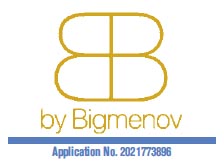 The claimed designation
under application No.
2021773896 with priority
dated November 11, 2021,
was filed for registration as
a trademark in respect
of goods in class 25 of the ICGS listed in the application.
The claimed designation
under application No.
2021773896 with priority
dated November 11, 2021,
was filed for registration as
a trademark in respect
of goods in class 25 of the ICGS listed in the application.
Rospatent refused to register this designation as a trademark due to its confusing similarity with a series of trademarks previously registered in respect of similar goods in class 25 of the ICGS and belonging to a single right holder (BALENCIAGA, France):
- under international registration No. 1497643;
- under international registration No. 1407690 with convention priority dated June 22, 2017;
- under international registration No. 1001691 with priority dated December 02, 2008;
- under international registration No. 805662 with priority dated April 09, 2003;
- under international registration No. 456166 with priority dated November 06, 1980.
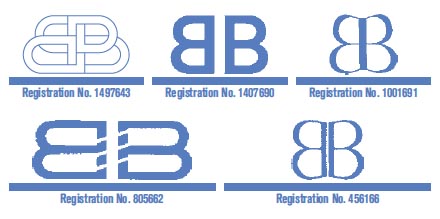
Registration No. 1497643 Registration No. 1407690 Registration No. 1001691 Registration No. 805662 Registration No. 456166
In addition, Rospatent noted that in accordance with Clause 1 of Article 1493 of the Civil Code, a written request was received from the right holder of the opposed marks containing arguments about the non-compliance of the claimed designation with the requirements of the legislation, of which the applicant was notified.
Rospatent refused a Russian firm to register a mark similar to the marks of the “unfriendly” American right holder being Sheraton International (Rospatent’s decision dated June 29, 2023, on application No. 2022744603)
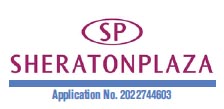
The combined designation under application No. 2022744603 filed with Rospatent on July 05, 2022, was claimed for registration as a trademark in the name of Granel Real Estate LLC, Republic of Bashkortostan, Ufa.
A decision was made on December 09, 2022, to refuse the state registration of the trademark in respect of services in Class 43 of the ICGS on the basis of the requirements of Subclauses 1 and 6 of Article 1483 of the Code, due to the similarity of the claimed designation with a series of trademarks registered earlier in respect of similar services in Class 43 of the ICGS and belonging to Sheraton International IP, LLC (USA):
- under Certificate No. 412611;
- under Certificate No. 60833;
- under Certificate No. 339945;
- under international registration No. 1299395;
- under international registration No. 1276292;
- under international registration No. 1254859.
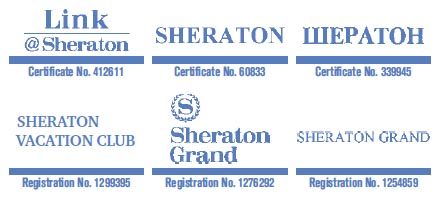
In an appeal to the unfavorable decision, the applicant argued that the said trademarks could not be cited due to the fact that their right holder — Sheraton International IP, LLC — is a company from the USA, a country unfriendly to the Russian Federation.
Rospatent did not take that argument into account and confirmed the decision to refuse registration of the mark.
In order to obtain protection of an industrial design in Russia on the basis of its international registration, the requirements of the Russian law must be complied with (Rospatent’s decision dated June 15, 2023, on the international registration of industrial design No. DM/220436)
In accordance with the Hague System for the International Registration of Industrial Designs, WIPO granted international registration No. DM/220436 to a group of industrial designs entitled “Graphic design” in the name of Kores Holding Zug AG (Switzerland):
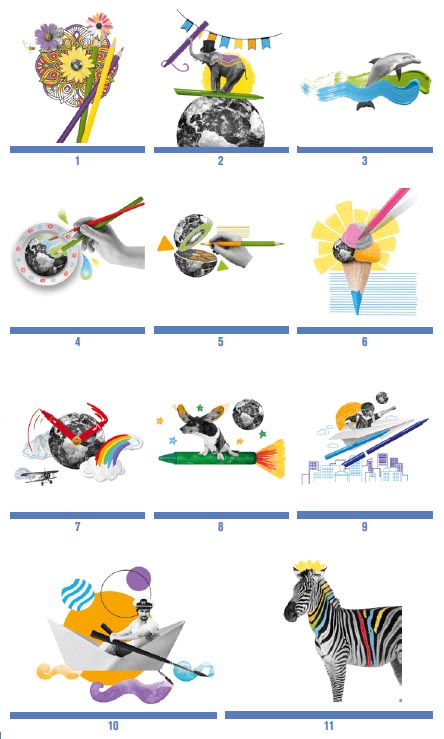
During the examination of this international registration, Rospatent sent a notice of refusal to grant protection due to violation of the unity requirement and invited the right holder to indicate one of the industrial designs for further consideration. The right holder chose sample No. 6 for further consideration.
 Further, based on the results of the examination, Rospatent sent a second notice of refusal to grant protection because design No. 6, named “Graphic design” in the registration, is not a protectable subject matter in Russia as an industrial design. Namely, the decision of Rospatent states that in accordance with Clause 1 of Article 1352 of the Civil Code, the outer appearance of the product of industrial or handicraft production shall be protected as an industrial design. In this case, in accordance with Clause 32 of the Requirements for the Documents of the Industrial Design Application, the product is understood to be any product of industrial or handicraft production, in particular, packaging, label, composite product, set (kit) of products, font, as well as an independent part of the product, whereby an independent part of the product is understood to be its separate part visible in the course of normal operation of the product, in particular, drawings, graphic symbols, logos applied to the surface of the product.
Further, based on the results of the examination, Rospatent sent a second notice of refusal to grant protection because design No. 6, named “Graphic design” in the registration, is not a protectable subject matter in Russia as an industrial design. Namely, the decision of Rospatent states that in accordance with Clause 1 of Article 1352 of the Civil Code, the outer appearance of the product of industrial or handicraft production shall be protected as an industrial design. In this case, in accordance with Clause 32 of the Requirements for the Documents of the Industrial Design Application, the product is understood to be any product of industrial or handicraft production, in particular, packaging, label, composite product, set (kit) of products, font, as well as an independent part of the product, whereby an independent part of the product is understood to be its separate part visible in the course of normal operation of the product, in particular, drawings, graphic symbols, logos applied to the surface of the product.
As noted in the Rospatent decision, if a graphic image is claimed as an industrial design, in order to classify it as an independent part of a product, it is necessary to indicate the product for which it is intended. “Graphic design” No. 6 under the international registration has no indication of the product of which it forms an independent part, and therefore it cannot be protected.
Challenging the refusal to grant protection, the company, when filing its appeal, corrected the name of the claimed industrial design to “Drawing for pencil packaging”.
This adjustment to the title of the claimed solution was accepted by the collegium and eliminated the reason for the decision to refuse.
Thus, international registration No. DM/220436 is granted legal protection as an industrial design in respect of design No. 6 “Drawing for pencil packaging” in accordance with Paragraph One of Clause 1 of Article 1352 of the Code.
Disputes over Infringement of the Exclusive Right
Non-use of the trademark by the right holder himself or under his control may lead to refusal to protect the exclusive right to the trademark (Ruling of the Collegium on Economic Disputes of the Supreme Court No. 301-ЭС23–2808 dated June 30, 2023, on case No. А11–417/2019)
Individual entrepreneur Ibatullin filed a lawsuit against Planeta LLC for protection of the exclusive right to trademark “PLANETA” No. 299509 belonging to him. The entrepreneur demanded that the Company be prohibited from using a designation similar to the mark and claimed compensation for the infringement in the amount of 600 thousand rubles.
The court of first instance dismissed the claims. The court of appeal, supported by the cassation court (IP Court)), overturned the decision of the court of first instance and satisfied the claims in part, awarding 100,000 rubles of compensation from the Company.
The Collegium on Economic Disputes of the Supreme Court, having considered the Company’s cassation appeal, reversed the decisions of the court of appeal and the IP Court and upheld the judgment of the court of first instance to dismiss the claim.
At the same time, the Collegium of the Supreme Court reminded that in accordance with Clause 162 of Resolution of the Plenum of the Supreme Court No. 10 dated April 23, 2019, when assessing the likelihood of confusion between the trademark and the disputed designation, the court, in the presence of relevant evidence, should assess both the similarity of designations and the similarity of goods/services of the claimant and the defendant, as well as take into account other circumstances, including whether the trademark is used by the right holder in relation to specific goods/services. In connection with the latter, the court may investigate the issue of abuse of right on the part of the claimant, since the recognition of abuse of right on the part of the claimant is, by virtue of Clause 2 of Article 10 of the Civil Code, an independent ground for dismissal of the claim.
Since there is no evidence of the likelihood of confusion of designations in the eyes of consumers during the provision of comparable services in the case, and no adequate evidence of the use of the mark by the right holder himself and/or under his control was provided, while the Company proved the presence in the actions of the claimant to acquire and use the disputed service mark of signs of abuse of right, aimed at obtaining improper advantages in business activities, the conclusions of the court of first instance to dismiss the claim are lawful and justified.
Improper conduct of expert examination by court in a patent infringement case may serve as a ground for reversal of a court judgment based on it (Ruling of the Collegium on Civil Cases of the Supreme Court No. 4-KG23–7-K1 dated June 13, 2023)
Mr. Krivosheev and Mr. Nikitin filed a lawsuit against Polymer CJSC for infringement of the exclusive right to the utility model “Track dowel” under patent No. 186869. The claimants demanded that Polymer CJSC be obliged to cease production and sale of products manufactured using the utility model.
The court of first instance, whose judgment was upheld by the courts of appeal and cassation during the reconsideration, dismissed the claim.
The Collegium on Civil Cases of the Supreme Court, having considered the cassation appeal of the patent holders, reversed the decisions of the lower courts and remanded the case for a retrial by the court of appeal.
At the same time, the Collegium of the Supreme Court noted that in order to properly resolve the case, the court was to determine whether the products being manufactured and sold by the defendant utilizing each feature of the utility model as set forth in the utility model independent claim. To clarify this issue, the court should have ordered an expert examination and made available to the expert full-scale specimens of the dowel being manufactured by the defendant after its modification.
However, when ordering a reexamination, the court of appeal sent a 3‑volume file to the expert institution in November 2021. At the same time, the court of appeal did not send full-scale specimens of the dowel being produced by the defendant to the expert institution. The expert institution, pointing out the insufficiency of materials for solving the questions put to the experts, asked twice to provide the dowels being produced by Polymer CJSC as full-scale specimens and to extend the term of the examination. Later, the court received samples of the product “Plastic dowel”, which were received by the representative of the expert institution only in April 2022.
However, it followed from the expert report submitted to the court in April 2022 that the full-scale specimens of dowels being produced and sold by Polymer CJSC were submitted for examination in the amount of 3 pieces in accordance with the court’s ruling on the ordering an expert examination and were received simultaneously with the files of the case. Meanwhile, this information does not correspond to the content of the ruling to appoint a patent and technical examination and contradicts the above-mentioned circumstances.
In addition, the said expert report and the materials attached to it do not contain any information that the head of the expert institution instructed the expert who signed the report to conduct that examination, as well as the fact that the expert instructed any employee of the expert institution to inform the court, which ordered the examination, about the insufficiency of the submitted materials and to request the necessary full-scale specimens of dowels being produced by the defendant. Also, there is no evidence in the files of the case that the court requested Polymer CJSC to provide full-scale specimens of the dowels produced by it.
Under such circumstances, the expert report, as obtained in violation of the provisions of Articles 55, 73, 74, 84, and 85 of the Civil Procedure Code, could not be used as a basis for the court of appeal’s conclusions.
Rospatent Practice
1. Well-known trademarks
For the period from March to August 2023, Rospatent recognized the following trademarks as well-known:

Right Holder — Aquafor LLC, (RU)
Goods/Services — f11 — drinking water filters
Date of Becoming Well-Known — September 01, 2021

Right Holder — Gas Industry Insurance Company JSC, (RU)
Goods/Services — 36 — insurance
Date of Becoming Well-Known — November 01, 2022

Right Holder —Malon Fashion Group JSC, (RU)
Goods/Services — 25 — apparel
Date of Becoming Well-Known — January 01, 2022
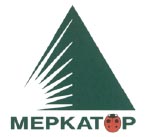
Right Holder — Mercator Holding LLC, (RU)
Goods/Services — 12 — vehicles, namely road and utility machinery
Date of Becoming Well-Known — August 22, 2019
During the same period, Rospatent refused to recognize the following designations as well-known trademarks:
- trademark of the Russian Federation No. 848409 and international trademark No. 1518860 owned by Savushkin Product OJSC (BY).
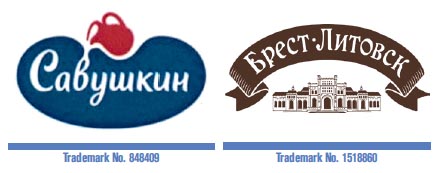
As a ground for refusal, Rospatent pointed out that the documents submitted by the applicant did not allow making an unambiguous conclusion about the person with whom this designation was associated, since the business activities in the Russian Federation are conducted by Savushkin Product LLC and Savushkin Product-Moscow LLC, and the totality of all the submitted materials did not form an idea about the relationship of the claimed designation with the applicant’s foreign company Savushkin Product OJSC (BY).
- a designation used as a trademark.

Rospatent refused foreign company SPORT & FASHION MANAGEMENT PTE. LTD. (SG) to recognize the designation as a well-known mark, indicating that it is impossible to make an unambiguous conclusion about the person with whom the designation is associated from the submitted materials, because the business activity in the Russian Federation is carried out by SPORMASTER LLC (RU), and the submitted materials do not form an idea about the relationship of the claimed designation with the foreign company of the Applicant.
- a designation used as a trademark.

Rospatent refused Udarnitsa Confectionery Factory OJSC (RU) to recognize the designation as a well-known mark because most of the documents submitted to confirm its use relate to the period after the date on which the applicant requested to recognize its well-knownness, and the materials relating to the period before the claimed date of well-knownness do not form an idea about the wide popularity of the designation.
2. Appellations of Origin and Geographical Indications
For the period from March to August 2023, Rospatent registered 8 geographical indications and 5 appellations of origin of goods:
(Number in the Register of Geographical Indications and Appellations of Origin — Geographical indication/appellation of origin — Goods)
296(AOG) — ROMANOV TOY — clay toy for decorative, applied and game purposes
309 (AOG) — SHUGOZERSKAYA PAINTING — decorative and utilitarian painted woodware
310 (GI) — BALAKHTA COAL — brown coal
311 (GI) — DAGOMYSCHAY — Tea
312 (GI) — KACHUGA BUTTER — Butter
313 (AOG) — KAZAN PATTERNED LEATHER — patterned boots (ichigi), half boots, women’s sabots, bags, decorative pillows and panel pictures
314 (GI) — BIROBIDZHAN
SCHNITZEL — Schnitzel
315 (GI) — KARELIAN HONEY — Honey
316 (GI) — RYAZAN BEER — Beer
317 (AOG) — ZAKHOZHSKOE (KIRISHSKOE) LACE — hand-weaved bobbin lacery
318 (AOG) — NAGUTSKAYA‑56 — natural mineral drinking therapeutic-table water
319 (GI) — MALKA — natural mineral drinking table water
320 (AOG) — BASHKIR HORSE — Horse
321 (GI) — PYATIGORSK ICE CREAM — ice cream
Intellectual Property News of the Eurasian Economic Union and Neighboring Countries
1. EAPO and EAEU
The Eurasian and Chinese patent offices will continue to cooperate under the PPH program on an ongoing basis
Effective April 01, 2023, the Patent Prosecution Highway Program (PPH Program) between the Eurasian Patent Office and the China National Intellectual Property Administration (CNIPA) has been extended indefinitely.
In connection with the EAPO obtaining the status of International Search Authority (ISA) and International Preliminary Examining Authority (IPEA) under the Patent Cooperation Treaty (PCT), the Offices also agreed to include the results of the PCT-PPH work in the PPH Program.
Eurasian patent attorneys have established a professional association (message on the EAPO website dated April 26, 2023)
At the meeting with Eurasian patent attorneys that was held at the Eurasian Patent Office on April 26, 2023 (World Intellectual Property Day), the initiative to create a professional organization — Eurasian Patent Attorneys Assembly (EPAA) — was announced and implemented.
The founders of the new organization, the constituent congress of which was held on April 26, 2023, at the EAPO office in Moscow, include more than two dozen Eurasian patent attorneys from seven EAPO member states: Russia, Belarus, Kazakhstan, Armenia, Kyrgyzstan, Tajikistan and Azerbaijan.
Membership in the EPAA will be voluntary, and only a professional with this status will be eligible to join the organization.
The EPAA governance structure will be traditional: the permanent governing body will be the Council of the Assembly headed by the President, and the executive governing body will be the President of the EPAA.
At the inaugural congress, Eduard Shablin (Russian Federation), a Eurasian patent attorney and Partner of Patentika law firm, was elected as President of the EPAA, and his colleague Sergey Belyaev (Republic of Belarus), Managing Partner of Belyaev and Partners law group, was elected as Chairman of the Council.
As stated on the EPAA website, the goals of the new organization are:
- Coordination of professional activities of Eurasian patent attorneys as an element of Eurasian integration in the field of industrial property.
- Promotion of the development of the institution of patent attorneys in the Eurasian region.
- Assistance to members of the Organization in their professional activities.
Armenia and Tajikistan have started accepting applications for patents in the form of 3D models (announcements on the website of the Armenian patent office dated May 17, 2023, and on the website of the Tajikistan patent office dated April 06, 2023)
Armenia and Tajikistan have joined the countries of the Eurasian Patent Organization (EAPO), whose patent offices have implemented the possibility of adding digital three-dimensional models to patent applications for inventions and industrial designs.
Applicants can now take advantage of 3D visualization to further explain the essence of the claimed invention and to better visualize the appearance of the products for which a patent or industrial design is sought.
2. Belarus
The Supreme Court of the Republic of Belarus has published the statistics of the consideration of cases by the Collegium on Intellectual Property Cases for the first half of 2023 (announcement by the Press Service of the Supreme Court of the Republic of Belarus dated August 02, 2023)
In the first half of 2023, the Collegium on Intellectual Property Cases of the Supreme Court of the Republic of Belarus considered 75 court cases related to disputes in the field of intellectual property.
56 cases were disputes in the field of copyright and allied rights; 19 cases were disputes in the field of industrial property law.
The most common lawsuits related to copyright protection are debt and compensation collection; they accounted for more than half of such disputes. The Collegium on Intellectual Property Cases partially or fully granted 28 out of 56 lawsuits in copyright disputes. Nine cases were dismissed due to reconciliation of the parties, and 8 cases were denied.
In the field of industrial property, more than half of the disputes are claims for recovery of license fees. Six cases were related to the legal protection of trademarks. In 5 out of 19 cases on industrial property disputes, the claims were satisfied in full or in part, and in 4 cases the claims were denied.
In 7 cases, the proceedings were terminated due to claimants waiver of claims, in 2 cases — due to approval of settlement agreements.
Amendments have been made to the regulatory acts governing procedures at the patent office (Resolution of the Council of Ministers of the Republic of Belarus dated July 28, 2023)
Resolution No. 493 has been adopted in order to improve the procedure for granting legal protection to intellectual property subject matters and to implement the provisions of Law of the Republic of Belarus No. 243-З dated January 9, 2023, On Amendments to the Laws on Legal Protection of Intellectual Property Subject Matters.
The Resolution amends government regulations governing:
- Registration of license agreements, agreements on assignment of rights to industrial property subject matters, agreements on pledge of property rights certified by a trademark or service mark certificate, and complex business license (franchising) agreements.
- Trademark and service mark registration.
- Drafting of the application for granting a patent for invention, its examination and taking a decision following the results of the examination.
- Drafting of the application for granting a patent for utility model, its examination and taking a decision following the results of the examination and conducting information search on the utility model application.
- Drafting of the application for granting a patent for industrial design, its examination and taking a decision following the results of the examination.
- Examination of the application for granting a patent for plant variety and taking a decision following its results.
- Drafting of the application for registering an integrated circuits topography, its examination and taking a decision following the results of the examination.
- Granting the right to use a geographical indication.
- Consideration of complaints, appeals, claims by the Board of Appeal under the patent authority.
3. Kazakhstan
The President of Kazakhstan has signed the Law on Ratification of the Agreement on Cooperation of the CIS Member States on Prevention and Suppression of the Use of False Trademarks and Geographical Indications (Law No. 11-VIII ЗРК dated June 19, 2023)
Kazakhstan has ratified the Agreement on cooperation of the CIS member states aimed at protecting consumers and producers from the sale of goods illegally marked with designations identical or confusingly similar to protected trademarks and geographical indications.
The Agreement itself was made in Minsk on May 28, 2021. The parties to the Agreement are Armenia, Azerbaijan, Belarus, Kazakhstan, Kyrgyzstan, Tajikistan and Uzbekistan.
4. Kyrgyzstan
New Patent Law of Kyrgyzstan
On April 07, 2023, new Patent Law No. 69 dated March 23, 2023, entered into force in Kyrgyzstan. At the same time, the Patent Law of 1998 became invalid.
The new law has increased the maximum term of a utility model patent from 8 to 10 years, while the maximum term of an industrial design patent has been increased from 15 to 25 years.
The approach to the determination of the holder of the right to obtain a patent for an invention, utility model or industrial design created under a state contract has been changed. By default, this right belongs to the Kyrgyz Republic, but the state contract may provide otherwise.
The list of essential features of the industrial design is excluded from the application and is not given in the patent, and when establishing novelty, the scope of protection and the fact of use of the software, the essential features are determined only from the images of the product.
The possibility of granting a patent for invention and industrial design under the applicant’s responsibility (without conducting a substantive examination) is excluded. As a result, preliminary examination is no longer required for these subject matters. As before, a utility model application is subject to formal and preliminary examination, but the new law provides for the possibility to request an accelerated preliminary examination: within 6 months instead of the standard 10 months.
The substantive examination of an industrial design application shall be carried out immediately after the formal examination is completed with a positive result; no separate request for substantive examination need be filed.
The time limit for substantive examination of an industrial design application is set at 5 months.
The Law has established a new ground for challenging an industrial design patent: the presence in the images of the product in the patent of essential features of the industrial design that are absent in the images submitted on the application filing date.
The situation with the consequences of recognizing a patent as invalid for previously concluded contracts has been settled. Such contracts shall remain in effect to the extent that they were performed on the date of the patent invalidity decision.
New Kyrgyzstan law on trademark protection
On April 15, 2023, the Law of the Kyrgyz Republic On Trademarks, Service Marks, Geographical Indications, and Appellations of Origin of Goods (Law No. 70 dated March 24, 2023) came into force. At the same time, the Law on Trademarks, Service Marks, and Appellations of Origin of Goods of 1998 became invalid.
The restriction on the possibility to register trademarks only by individuals engaged in entrepreneurial activities has been removed in the new law.
The restriction on the registration of visually indistinguishable, sound and olfactory marks has been removed.
When registering designations that initially have no distinctiveness as trademarks, the new law allows taking into account the distinctiveness acquired as a result of using the designation. It is now possible to submit divisional applications while keeping the priority of the original application.
Publication of information about applications and the possibility for third parties to submit, within 3 months after the publication of the application, oppositions against registration, which are to be considered during the examination of the claimed designation, is provided for.
For the purposes of preserving an unused mark, the law provides for that when the right to a trademark is transferred by way of legal succession, the start date of the 3‑year period of permissible non-use shall be moved to the transfer registration date. In addition, a mandatory pre-trial procedure for settling a dispute over non-use of a trademark has been introduced: first, the interested party must apply to the trademark owner with a proposal to abandon the mark or transfer the mark to that person.
If within two months the parties cannot agree upon, the interested person may, within one month after that, turn to the court asking to terminate the registration early.
The new law provides for a one-year ban on registration of the terminated trademark in the name of another person, if the protection has been terminated due to its expiration, due to the death of the owner or liquidation of the owner being a legal entity, as well as due to the owner’s waiver of the trademark.
5. Turkmenistan
The law on legal protection of integrated circuits topographies was adopted in Turkmenistan
On June 08, 2023, the Law of Turkmenistan on Legal Protection of Integrated Circuits Topographies dated June 3, 2023, entered into force. The law regulates relations connected with the creation, legal protection and use of integrated circuits topographies.
Only original topography, i. e., the one created as a result of creative activity of its author and not known before, is the subject matter of legal protection of topographies.
The authorized body in the field of legal protection of topographies is the State Intellectual Property Service of the Ministry of Finance and Economy of Turkmenistan (Turkmenpatent).
Simultaneously with the entry into force of the new law, the Law of Turkmenistan on Legal Protection of Algorithms, Computer Programs, Databases and Integrated Circuits Topographies dated September 23, 1994, became invalid.









